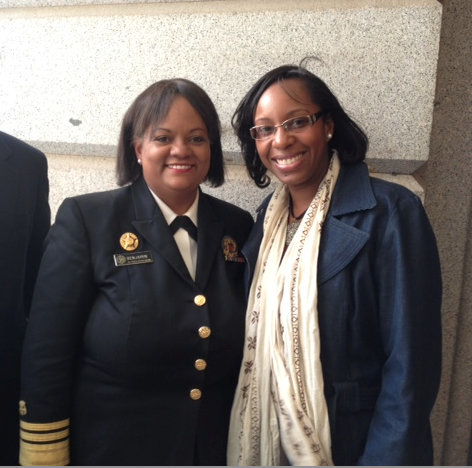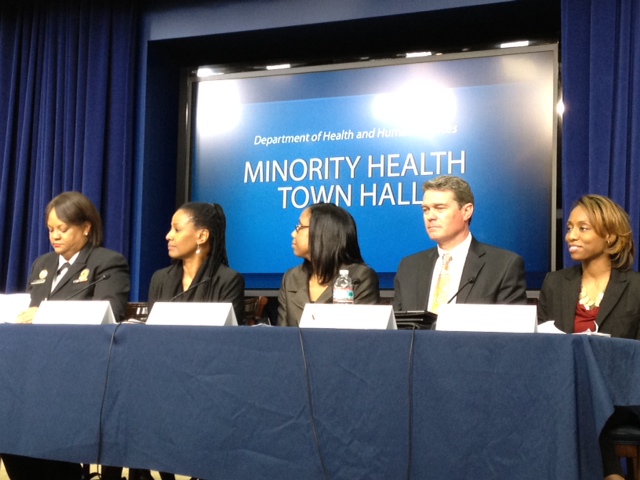
U.S. Surgeon General Dr. Regina Benjamin and Me
Editor?s Note: This is a guest post by Stacey Ferguson, known as Justice Fergie, who attended an event on our behalf at The White House.
Last month I had the honor of attending the Department of Health and Human Services? (HHS) Minority Health Blogger Townhall at The White House on behalf of Ella Media to engage in an open conversation on how the Affordable Care Act will impact minority communities.
It?s interesting ? when Melanie first asked me if I?d be willing to cover it, my initial reaction was ?that?s not my thing.? As it turns out, I couldn?t have been more wrong ? not to mention, it?s that very attitude that has landed us in the healthcare mess that we find ourselves in today.
The Townhall was attended by an array of influential players in the healthcare field and featured a panel of power players:

The Panel
Mayra Alvarez, Director of Public Health Policy, Office of Health Reform, HHS
Cecilia Munoz, Director of Domestic Policy Council
Kathleen Sebelius, Secretary, HHS
Dr. Regina Benjamin, Surgeon General, HHS
Dr. J. Nadine Gracia, Acting Deputy Assistant Secretary for Minority Health
& Director of the Office of Minority Health, HHS
B. Smith, Restauranteur, Author, and Lifestyle Expert
The discussion was eye-opening and, in all honesty, reassuring. Watching politicians and the news media hurl stones and scary predictions back and forth about the state of healthcare is extremely disconcerting; however the actual policymakers and administrators at this Townhall showed that the situation is not all ?gloom and doom.? Here?s a look at some of the positive themes that were covered:
- Historically, the U.S. healthcare system has been about treating the sick and injured; there is a new philosophy being implemented that is pushing our systems to make preventive care a priority ? that is education, proactive programs and resources ? which will have long-reaching effects on the way we view healthcare. Preventive care is especially important for minority communities with an aversion to doctors and hospitals and a tendency towards sedentary lifestyles and unhealthy diets.
- A renewed focus on community centers as the nucleus of minority, immigrant and low-income communities promises to reach those who need services and treatment where they live and work. This proposition resonated with me in particular, because minorities ? Latinos and blacks of Caribbean descent (like my own family) especially, from my experience, are extremely hesitant ? terrified even ? of seeking medical services. Coming to our communities to a trusted and familiar location may help to break down the barriers of mistrust and fear and provide these populations with the services that they need.
- A commitment to teaching youth practical life skills and self-care strategies that will follow them throughout their adult life, i.e., a return to Home Economics. This approach will ultimately impact the healthcare system in a deep and lasting way: for example, encouraging gardening skills will encourage fruit and vegetable consumption; providing opportunities for fitness and exercise will help to curb obesity, heart diseases and stress related ailments; teaching cooking techniques will foster healthy eating and less of a dependence on processed foods. An collateral benefit of teaching life skills like these to our youth might be a decrease in violence ? as B. Smith stated during the discussion: a teenager armed with life skills will be less likely to pick up a weapon or engage in destructive behavior.
Truth be told, we are living in an exciting time in terms of access to information and having power to impact the policies and laws that impact us ? the Internet and social media allow us, especially communities of color who have had little to no voice in previous times, to participate in the national conversation. Let?s not let the White House?s commitment to involving Latinos and blacks and other minority groups in the policy-making process go unnoticed. For starters, we can educate ourselves on what the Affordable Care Act entails and what that means for our communities. Here are some helpful links to get started:
As someone who grew up in Canada with immediate, abundant and FREE access to healthcare for the first 18 years of my life, until I came to the U.S. for college, my attitude towards healthcare has been frustration at the fragmented U.S. system that?s full of land mines and red tape. Now, as a mother of three and most recently, as a solopreneur who can no longer rely on health benefits paid for in large part by my government employer, I have a vested interest in understanding what the ACA means for me, my family and my larger community. Health care is most certainly ?my thing.?
Watch the full video of the Townhall here.
 Justice Fergie?s?Life IS the Party inspires readers to celebrate the everyday! A long-time entertaining enthusiast, Stacey (aka Justice Fergie), loves throwing parties, cooking, decorating, getting glam,?and?all things special occasion-related. ?Through covering lifestyle topics related to Family, Success, Food, Style?and?Life, Stacey ? a wife and lawyer mom of 3 children under 8 years old ? reminds us to infuse our daily lives with memory-worthy experiences. ?Her?{re}Treat Yourself Lifestyle Event Series brings this philosophy to life. ?She is an avid blogger, event producer, social media personality, public speaker, freelance writer, and Chief Curator of the?Be Blogalicious community and conferences.
Justice Fergie?s?Life IS the Party inspires readers to celebrate the everyday! A long-time entertaining enthusiast, Stacey (aka Justice Fergie), loves throwing parties, cooking, decorating, getting glam,?and?all things special occasion-related. ?Through covering lifestyle topics related to Family, Success, Food, Style?and?Life, Stacey ? a wife and lawyer mom of 3 children under 8 years old ? reminds us to infuse our daily lives with memory-worthy experiences. ?Her?{re}Treat Yourself Lifestyle Event Series brings this philosophy to life. ?She is an avid blogger, event producer, social media personality, public speaker, freelance writer, and Chief Curator of the?Be Blogalicious community and conferences.
how to tie a bow tie chick fil a chick fil a diverticulitis jello shots bowl games abc store
No comments:
Post a Comment
Note: Only a member of this blog may post a comment.